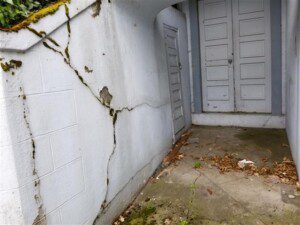
As a home inspector, I often have clients that tell me that their main concern is the condition of the foundation. Most home buyers are privy to the fact that foundation issues could be expensive to repair, and not necessarily something that an average homeowner can do themselves. Most people will point out and ask about foundation cracks during a home inspection, because they are usually obvious and can be easily identified. With some limitations, a home inspector can help clients better understand which type of cracking is normal and not a major issue, and which cracks indicate major issues that will require repair.
When foundation cracks are inspected, several factors are considered. When a foundation crack meets the following criteria, home inspectors will recommend further evaluation by a foundation contractor or structural engineer.
• The crack with if more than ¼ inch wide, or if you can fit the tip of your pinky into the crack.
• The crack is larger at one end than the other.
• The foundation wall is displaced horizontally, or the foundation surface is not even at the two sides next to the crack.
• The crack runs horizontal to the top and bottom of the foundation wall.
• The crack looks newly formed (has sharp edges, no dust or cobwebs built up inside the crack).
• The crack has been previously repaired and has cracked again.
Since home inspectors are generalists, we use these criteria and thresholds in order to determine if cracked foundations should be further evaluated by a licensed specialist. There are more complex factors that dictate whether a foundation requires repair, the type of repairs that are needed, and the costs of repair. Obtaining more information about these particular details requires further evaluation by a foundation specialist or structural engineer when the above types of foundation cracks are found.
When normal foundation cracks are found, they are usually either shrinkage cracks or vertical settlement cracks. Cracks that are less than a ¼ inch are usually not a major concern (unless newly formed). However, it is recommended to seal all foundation cracks since they could lead to water intrusion issues. Long term water intrusion issues could lead to moisture damage, mold growth, and major foundation damage over time. Therefore, all foundation cracks should be sealed.
Sealing a foundation crack can be a DIY project, but some skills are required. If you can operate a caulk gun, you can most likely seal a foundation crack. It is important to use the proper materials and techniques to repair foundation cracks, otherwise the repairs will eventually fail. Check out the videos below on how to repair foundation cracks.
